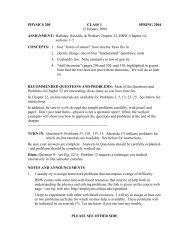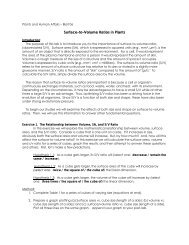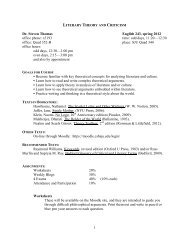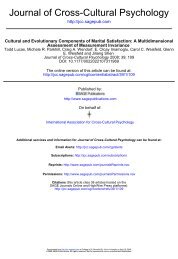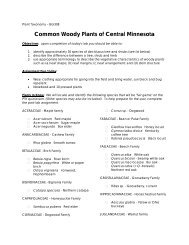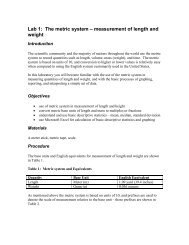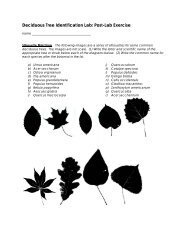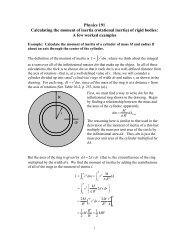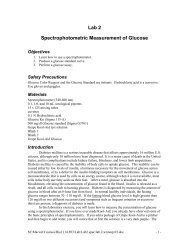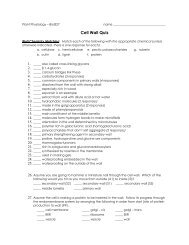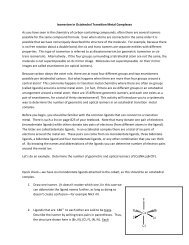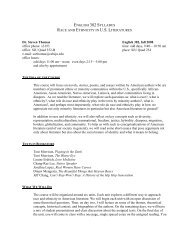27strongest, <strong>of</strong> the least pressed, <strong>of</strong> the richest.... While at onepoint there is a shortage <strong>of</strong> wealth, at another there is asurfeit <strong>and</strong> squ<strong>and</strong>ering <strong>of</strong> the same. While one producersells a great deal, or at high prices <strong>and</strong> with an enormouspr<strong>of</strong>it, another sells nothing or sells at a loss.... Supply isignorant <strong>of</strong> dem<strong>and</strong>, <strong>and</strong> dem<strong>and</strong> is ignorant <strong>of</strong> supply.You produce on the basis <strong>of</strong> a preference or a fashionprevalent among the consuming public; but by the timeyou are preparing to put your commodity on the market,the mood has passed <strong>and</strong> some other kind <strong>of</strong> product hascome into fashion.... The inevitable consequences arecontinual <strong>and</strong> spreading bankruptcies, miscalculations,sudden collapses, <strong>and</strong> unexpected fortunes; trade crises,unemployment, periodic surfeits <strong>and</strong> shortages; instability<strong>and</strong> decline <strong>of</strong> wages <strong>and</strong> pr<strong>of</strong>its; the loss or enormouswaste <strong>of</strong> wealth, <strong>of</strong> time, <strong>and</strong> <strong>of</strong> effort in the arena <strong>of</strong> fiercecompetition.” [Pecqueur, p. 414-16]Ricardo in his book [On the Principles <strong>of</strong> Political Economy et al](rent <strong>of</strong> l<strong>and</strong>): Nations are merely workshops for production, <strong>and</strong>man is a machine for consuming <strong>and</strong> producing. Human life is apiece <strong>of</strong> capital. <strong>Economic</strong> laws rule the world blindly. For Ricardo,men are nothing, the product everything. In Chapter 26, <strong>of</strong> theFrench translation, we read:“To an individual with a capital <strong>of</strong> 20,000 pounds, whosepr<strong>of</strong>its were 2,000 per annum, it would be a matter quiteindifferent whether his capital would employ a hundred ora thous<strong>and</strong> men... is not the real interest <strong>of</strong> the nationsimilar? Provided its net real income, its rents <strong>and</strong> pr<strong>of</strong>its,be the same, it is <strong>of</strong> no importance whether the nationconsists <strong>of</strong> 10 or 12 million inhabitants.” [Ricardo, pp. 234-5]“In truth,” says M. de Sismondi, “it remains only to desirethat the king, who has been left quite alone on the isl<strong>and</strong>,should, by continuously cranking up a number <strong>of</strong>automatons, get all Engl<strong>and</strong>’s work done.” [J. C. L.Simonde de Sismondi, Nouveaux principes d’economicpolitique, 2 volumes, Paris, 1819, II, p. 331]“The master who buys a worker’s labor at a price so lowthat it is barely enough to meet his most pressing needs isresponsible neither for the low wages nor the long hours <strong>of</strong>work: he himself is subject to the law which he imposes....Misery is the product not so much <strong>of</strong> men as <strong>of</strong> the power<strong>of</strong> things.” [Buret, I, p. 82]“The inhabitants <strong>of</strong> many different parts <strong>of</strong> Great Britainhave not capital sufficient to improve <strong>and</strong> cultivate all theirl<strong>and</strong>s. The wool <strong>of</strong> the southern counties <strong>of</strong> Scotl<strong>and</strong> is, agreat part <strong>of</strong> it, after a long l<strong>and</strong> carriage through very badroads, manufactured in Yorkshire, for want <strong>of</strong> capital tomanufacture it at home. There are many littlemanufacturing towns in Great Britain, <strong>of</strong> which theinhabitants have not capital sufficient to transport theproduce <strong>of</strong> their own industry to those distant marketswhere there is dem<strong>and</strong> <strong>and</strong> consumption for it. If there areany merchants among them, they are properly only theagents <strong>of</strong> wealthier merchants who reside in some <strong>of</strong> thegreater commercial cities.” [Smith, I, pp. 326-7]“The annual produce <strong>of</strong> the l<strong>and</strong> <strong>and</strong> labor <strong>of</strong> any nationcan be increased in its value by no other means but byincreasing either the number <strong>of</strong> its productive laborers, or theproductive powers <strong>of</strong> those laborers who had before beenemployed.... In either case, an additional capital is almostalways required.” [Smith, I, pp. 306-7]“As the accumulation <strong>of</strong> stock must, in the nature <strong>of</strong> things,previous to the division <strong>of</strong> labor, so labor can be more <strong>and</strong>more subdivided in proportion only as stock is previouslymore <strong>and</strong> more accumulated. The quantity <strong>of</strong> materialswhich the same number <strong>of</strong> people can work up, increasesin a great proportion as labor comes to be more <strong>and</strong> moresubdivided; <strong>and</strong> as the operations <strong>of</strong> each workman aregradually reduced to a greater degree <strong>of</strong> simplicity, avariety <strong>of</strong> new machines come to be invented forfacilitating <strong>and</strong> abridging these operations. As the division<strong>of</strong> labor advances, therefore, in order to give constantemployment to an equal number <strong>of</strong> workmen, an equalstock <strong>of</strong> provisions, <strong>and</strong> a greater stock <strong>of</strong> materials <strong>and</strong>28
2930tools than what would have been necessary in a ruder state<strong>of</strong> things, must be accumulated beforeh<strong>and</strong>. But thenumber <strong>of</strong> workmen in every branch <strong>of</strong> business generallyincreases with the division <strong>of</strong> labor in that branch, orrather it is the increase <strong>of</strong> their number which enablesthem to class <strong>and</strong> subdivide themselves in this manner.”[Smith, I, pp. 241-2]“As the accumulation <strong>of</strong> stock is previously necessary forcarrying on this great improvement in the productivepowers <strong>of</strong> labor, so that accumulation naturally leads tothis improvement. The person who employs his stock inmaintaining labor, necessarily wishes to employ it in sucha manner as to produce as great a quantity <strong>of</strong> work aspossible. He endeavors, therefore, both to make among hisworkmen the most proper distribution <strong>of</strong> employment,<strong>and</strong> to furnish them with the best machines which he caneither invent or afford to purchase. His abilities in boththese respects are generally in proportion to the extent <strong>of</strong>his stock, or to the number <strong>of</strong> people it can employ. Thequantity <strong>of</strong> industry, therefore, not only increases in everycountry with the increase <strong>of</strong> the stock which employs it,but, in consequence <strong>of</strong> that increase, the same quantity <strong>of</strong>industry produces a much greater quantity <strong>of</strong> work.”[Smith, I, p. 242]Hence overproduction.“More extensive combinations <strong>of</strong> productive forces... intrade <strong>and</strong> industry through the unification <strong>of</strong> morenumerous <strong>and</strong> more varied human <strong>and</strong> natural forces forundertakings on a larger scale. Also, there are already anumber <strong>of</strong> cases <strong>of</strong> closer links among the main branches<strong>of</strong> production themselves. Thus, large manufacturers willtry to acquire large estates in order to avoid depending onothers for at least a part <strong>of</strong> the raw materials they need fortheir industry; or they will set up a trading concern linkedto their industrial enterprises <strong>and</strong> not only sell their ownproducts but buy up <strong>and</strong> retail other sorts <strong>of</strong> goods to theirworkers. In Engl<strong>and</strong>, where there are some factory ownerswho employ between 10- <strong>and</strong> 12,000 workers... similarcombinations <strong>of</strong> different branches <strong>of</strong> production underthe control <strong>of</strong> one man, small states or provinces within astate, are not uncommon. For example, the mine-ownersnear Birmingham recently took over the entire process <strong>of</strong>iron production, which was previously in the h<strong>and</strong>s <strong>of</strong>several different entrepreneurs <strong>and</strong> owners. See ‘Derbergannische Distrikt bei Birmingham’, DeutscheVierteljahrsschrift, no.3, 1838. Finally, in the larger jointstockcompanies, which have become so numerous, wefind extensive combinations <strong>of</strong> the financial resources <strong>of</strong>many shareholders with the scientific <strong>and</strong> technicalknowledge <strong>and</strong> skills <strong>of</strong> others to whom the execution <strong>of</strong>the work is entrusted. In this way, it is possible for manycapitalists to apply their savings in a more diversified way<strong>and</strong> even invest them simultaneously in agricultural,industrial, <strong>and</strong> commercial production; as a result, theirinterests also become more diversified <strong>and</strong> the conflictbetween agricultural, industrial, <strong>and</strong> commercial interestsbegins to fade away. But the greater ease with whichcapital can be employed fruitfully in the most varied fieldsinevitably increases the conflict between the propertied<strong>and</strong> the propertyless classes.” [Schulz, pp. 241-2]The enormous pr<strong>of</strong>it which the l<strong>and</strong>lords make out <strong>of</strong> misery.The greater the misery caused by industry, the higher the rent.It is the same with the rate <strong>of</strong> interest on the vices <strong>of</strong> theproletariat. (Prostitution, drinking, the pawnbroker.)The accumulation <strong>of</strong> capitals increases <strong>and</strong> the competitionbetween them diminishes, as capital <strong>and</strong> l<strong>and</strong>ed property areunited together in one h<strong>and</strong> <strong>and</strong> capital is enabled, because <strong>of</strong> itssize, to combine different branches <strong>of</strong> production.Indifference towards men. Smith’s 20 lottery tickets. [Smith, I,p. 94]Say’s net <strong>and</strong> gross revenue.



